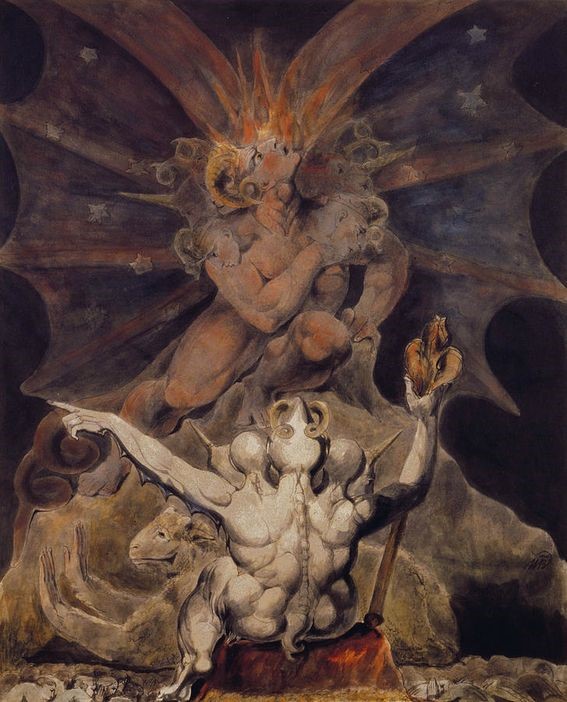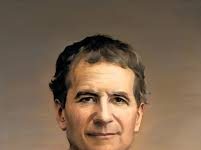There is an ancient Indian fable of six blind men who meet an elephant. Each of them touches different parts of the elephant. One of them, touching the elephant’s side, concludes that the elephant is like a wall. Another, touching the elephant’s trunk, believes the elephant is like a snake. Yet another touches the elephant’s tusk, and thinks he is sharp, like a spear. And so forth with the elephant’s other parts. The owner of the elephant, a certain Rajah, appears on the scene and chastises the six blind men for their ignorance. Then he explains to them that they see only the illusory (subjective) parts, and cannot see the real (objective) whole. The moral of the story is that all six blind men see only that part of the truth relative to their own experience, whereas the owner of the truth is the objective Rajah, who is not blind to what the elephant really is.
More directly to our point, the philosopher Ayn Rand was exceptional among atheists in being able to reason her way to a fundamental aspect of morality that is surely Catholic; namely, the belief that morals are objectively knowable because they are measurably rooted in the real world. Yet there are blind people (moral subjectivists) who deny this. Rand described the subjectivist as one “who sees reality as a contest of whims,” and who wants reality to be ruled by his whims – “which he proposes to accomplish by discarding as false everything discovered by others.” So the subjective view is a self generated and self justified version of reality. The subjectivist is repulsed by the authority of tradition, which is why he more often than not gives himself to radical causes, and why in general he is hateful toward religious authority altogether. When the community organizer Saul Alinsky dedicated his book Rules for Radicals to Lucifer, he outed himself as God’s most furious foe and the devil’s most devout disciple.
Possibly it was the great irony of her life that Rand, so proud of being an objectivist, should have been an atheist. There is nothing objective about atheism because there is no way to prove there is no God. So the power of reason itself, which Rand worshiped, failed to serve her purpose. Religion, Rand alleged, is a kind of vain pie-in-the-sky wish fulfillment, the least believable type of subjectivism. Had she been objective enough to analyze her own motive for reasoning thus, she might have seen that atheism is a sinister type of wish fulfillment, the wish never to subject one’s own thought or will to a Higher Authority. Rand rejected religion, and in doing so forgot that she was repudiating her own premise: she dared to justify atheism “by discarding as false everything discovered by others.” No one can doubt that religion has the authority of having been discovered by others long before the modern rise of atheism.
Whereas objective morality is true morality, morality that corresponds to the laws of nature and nature’s God, subjective morality is what some people would like to be true morality; or what, through no fault of their own, they have been wrongly led to believe is true morality. Eve ate of the forbidden fruit because she wanted to believe it would give her the powers of a god, as the serpent falsely led her to believe (Genesis 3:1-5). This kind of self deception is visible all around us today. For example, we see rampant and shocking obesity among Americans that senior citizens today hardly ever saw when they were young. People eat all they can eat of the worst types of food loaded with sugar, salt, and cholesterol because they want to believe that a palate explosion is natural and fulfilling. But objective morality says “No!” and then shows us that actions have consequences when we start to avoid looking at ourselves in a mirror, or begin to detect signs of heart disease or diabetes. The problem is to get people to see things for what they are, not for what they would like them to be. So often our craving for illicit pleasure overcomes our natural desire for the good, the true, and the beautiful. Some people can deceive themselves even when they look in a mirror, or they manage to find a mirror that trims twenty pounds from their waistline.
The sins that flesh is heir to, of course, go well beyond gluttony. The downward trajectory into hedonistic morals is reflected in a recent scientific survey suggesting people are more likely to consider good sex and adequate sleep, rather than a relationship with God, as the key to their happiness and well-being. Every other non-human species would likely agree that good sex and adequate sleep are among the highest goods of life. But as Christians, we loathe the secularist reduction ad absurdum of humanity to its purely animal nature. It is no accident of history that vulgar and pornographic language has become so pervasive, and that virtually no resistance to the decline of morals has allowed pejoratives like “pig” and “bitch” to become the common coin in the dialogue of our movies and the lyrics of our music. As those of us who are old enough to remember, it is a wild and tragic cultural shock that happened in one lifetime.
In the history of religion, one thing is certain; that the modern world of Christianity, once united, is now full of disunity, so much so that we commonly recognize our world has entered a post-Christian era. This fact has its origin during the Reformation when Luther, Henry VIII, Calvin, and others demonstrated their hatred for the Catholic truths that had united Christians for fifteen centuries. Orestes Brownson, the great American apologist and convert to Catholicism, in 1849 described the Protestant prejudice in a nutshell. “Protestants hate the Church. Why? Because they love truth? Nonsense. Because they believe her false, and destructive to the souls of men? Nonsense again. We hope there is no Catholic so stupid as to believe it. Hatred of the Church has nothing to do with concern for truth or for salvation…. Protestantism is nothing more or less than that spirit of lawlessness which leads every one to wish to have his own way … and subjectively, it is a craving for what is prohibited, because prohibited.” The vast breakup of early Protestantism into hundreds of sects, that even to this day are splintering off each other, is evidence of Brownson’s argument that hundreds of differing theologies cannot be anything but lawless in relation to the singular and lawful theology preached by Jesus Christ to the Church (not Churches) he founded and promised would never perish from the earth.
So the subjective mind tends to despise certain natural and supernatural laws, and seeks to overcome them in order to satisfy personal whims. In the political realm, this was so even in the ancient world. Perhaps Plato was the first great political subjectivist when he imagined a utopia perfectly designed and governed by philosopher/kings. In his imaginary perfect Republic everyone’s life is predetermined. That this creed of perfection does violence to nature (especially human free will) is never considered possible. Plato’s way to generate the “happy” society is to deprive citizens of their freedom to be different from each other. That is why, in the history of socialist nations, we see everywhere a command authority designing political and economic structures in such a way that no one is supposed to rise above the herd (except, of course, the philosopher/kings, who are exempt from the laws they have decreed).
After Thomas Jefferson in his old age read Plato, he remarked:
“While wading through the whimsies, the puerilities, and unintelligible jargon of Plato’s Republic, I laid it down often to ask myself how it could have been that the world should have so long consented to give reputation to such nonsense as this.”
George Orwell endorsed Jefferson’s sentiment and parodied Stalin’s evil plot when, at the end of his mocking fable Animal Farm, he had the great law of socialism posted on the barn wall for all the animals to read: “All animals are created equal, but some animals are more equal than others.”
In the moral realm, people can learn to recognize the subjective monster when they see him. This applies to both Christians and atheists. The Christian may lie to himself if he plays down his own wrongdoing as venial (minor), when it may well be mortal (deadly). For example, many Catholics like to suppose that neglecting the confessional is of minor significance. The atheist might play down his own wrongdoing when he does not see as wrong an act he has committed, and prefers to think of the act as something Christians are hung-up on. The farthest thing from his mind might be that the act could objectively be wrong. And anyway, whether or not it is wrong, there is no God to enforce retribution. Such reasoning is the quintessence of comforting subjective whimsy.
The great subjective monster is the devil, and the apt title given to Satan by Jesus in the Gospel of John is … Father of Lies (John 8:44). Now some theologians say that we can be taught a false morality, and that if we act according to this morality, it is not a violation of conscience. This is a very complex question, because theologians also teach us that God put in our hearts an objective sense of the natural law that we ought to obey. (cf., CCC, #1860) When we act against the natural law recognized by Aristotle, Saint Paul, and Aquinas, we will know it, because the law is in our hearts, and therefore cannot be overcome by any false teaching. This is why people change their lives; they convert from evil-doing to doing good, because they repent when they realize how they have been deceived by the Father of Lies.
The devil, that Subjective Monster, is apparently in hell because, as the poet Milton opined, he has lied to himself that it is better to rule in hell than to serve in heaven. What is hell really like? Perhaps the apologist Ronald Knox gave the best hypothetical description. “Going to Hell is going to a place where all the people, not just some people, all the time, not just some of the time, are trying to assert themselves and hate one another.” If it is the devil’s mission to make us hate rather than love one another, what better device could he have than to tell us lies about one another, as he told Adam and Eve the first lie about God, so that our first parents could claim equality not just with each other, but with their Creator? Or as Chesterton more deftly put it: “There is something much worse than Atheism which is Satanism; otherwise known as Being God.”
The present rage for breaking from all the realism of traditions and institutions is a symptom of both individual and national lunacy. The lunatics, it would seem, are in command of the proverbial asylum, and chances are slim we can escape the bedlam they have created. This is how it must have seemed to the early Christians who fled from the pagan lust for crucifixion and butchery. But times change. The pendulum swing of history is not kind to lunatics for a very good reason: their triumphs are in their heads, not in their hearts. Yes, we can be transformed, even redeemed. As Hilaire Belloc liked to say, “Do not imagine that broken things cannot be mended by the good angels.”
Atheist savants (again, think Ayn Rand) often insist that religion is a collective neurotic delusion bordering on insanity, and that we ought rather to be free to follow our self-serving willfulness wherever it leads. They are only half right. Yes, we are all free to gamble with eternity. But the atheist could ask himself (in a moment of supreme humility) if he might be wrong. What if there is a God, and this God has willed for us a rational and holy existence by following his laws rather than our own selfish desires? One answer for the atheist to consider (teasing himself into a momentary leap of faith) is whether he has noticed that the modern world has been lured by dark powers into a collective insanity so deep and so dark that it could be prelude to the End Times prophesied in scripture.
To quote the Catechism of the Catholic Church: “Christ the Lord already reigns through the Church, but all the things of this world are not yet subjected to him. The triumph of Christ’s kingdom will not come about without one last assault by the powers of evil.” We needn’t doubt that Belloc’s good angels do struggle to mend a world run amok, and perhaps many angels hover hopefully over many an atheist’s head. But if our age happens to be the penultimate age, if the downward spiral of subjective moral insanity should happen to be irreversible, even good angels cannot hold back that dark and thundering event foretold in Scripture … the ascent of the Antichrist … and following his reign … the Last Judgment.












